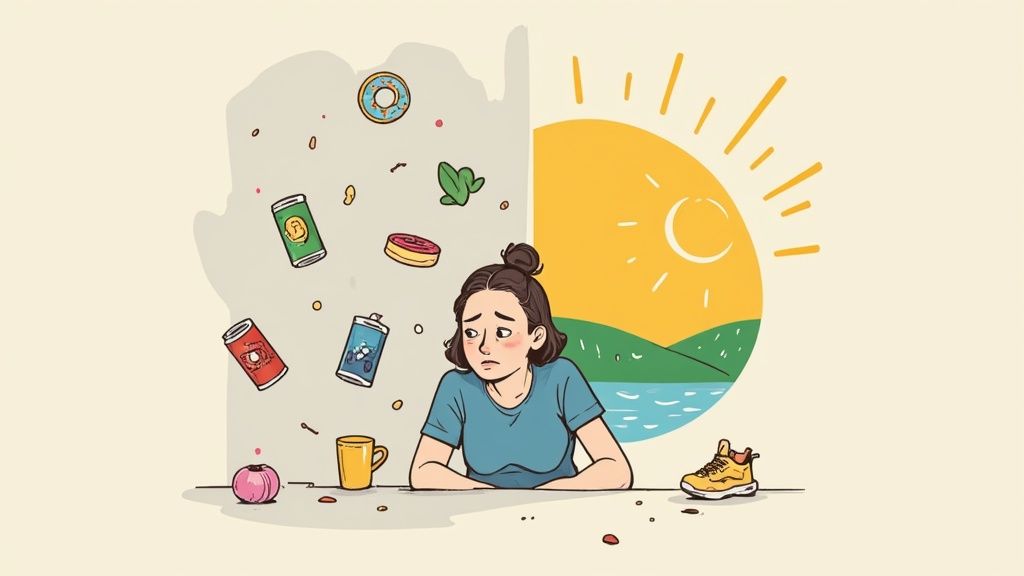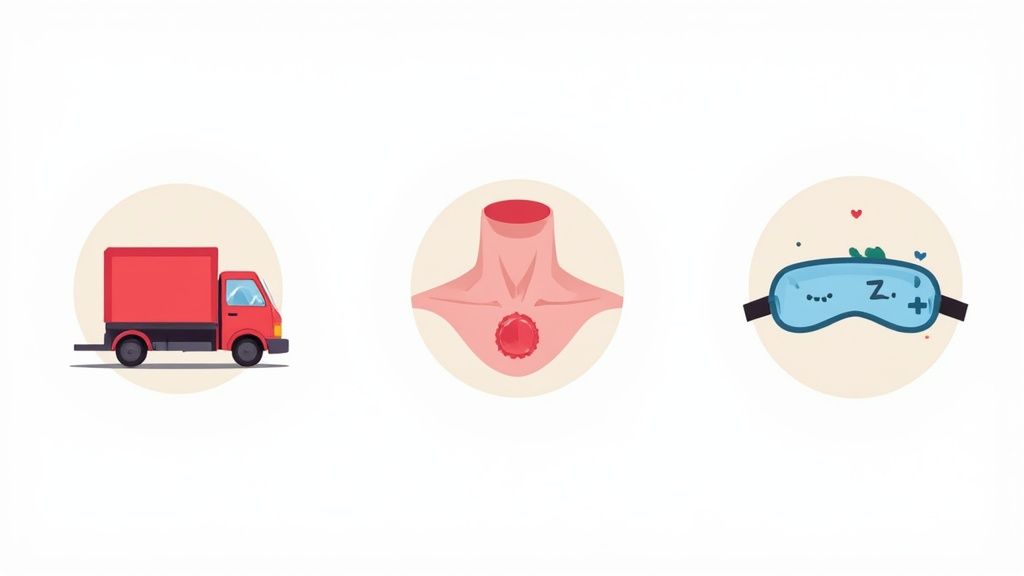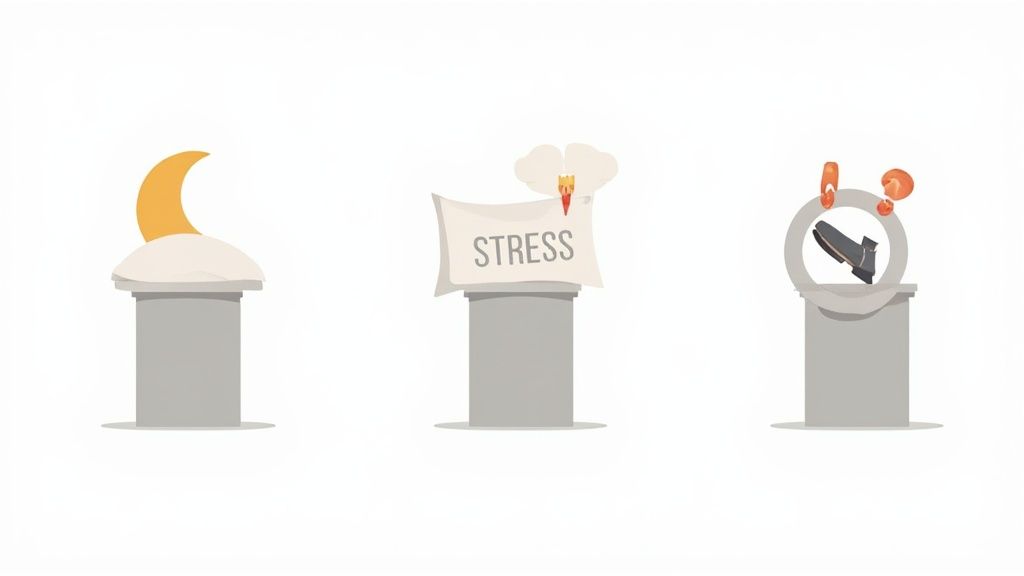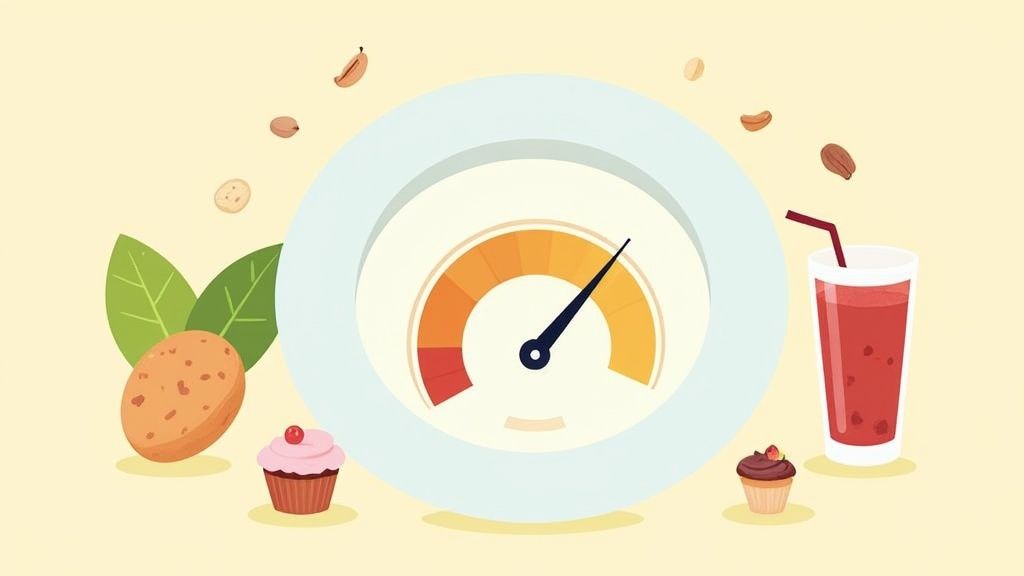What Causes Constant Fatigue and Tiredness: Causes & Fixes

It’s a uniquely frustrating feeling, isn't it? Going to bed after a long day, getting a full eight hours, and still waking up feeling completely drained. If you’re constantly asking yourself what’s causing this deep-seated fatigue, you are far from alone.
The answer is rarely just one thing. Instead, it’s usually a combination of factors that fall into three main buckets: your underlying health, your daily lifestyle, and, of course, your diet.

Unpacking the Roots of Your Exhaustion
Waking up feeling just as tired as when you went to bed is more than just a minor inconvenience; it messes with your work, your relationships, and your ability to enjoy life. Let's start digging into why your energy levels might be stuck on empty and what you can actually do about it.
This kind of exhaustion is incredibly common. A major 2023 study found that 15.1% of adults regularly feel fatigued, with 10.1% dealing with the chronic, long-term version. What’s really interesting is that the research showed medically unexplained fatigue is almost three times more common than fatigue linked to a specific medical diagnosis. You can dive into the specifics in the full study on fatigue prevalence.
That bone-deep tiredness isn’t just a sign you need more sleep. It’s a complex puzzle with pieces that all fit together.
To get a clearer picture, let's quickly map out the main areas that contribute to that run-down feeling.
Quick Guide to Fatigue Causes
| Category | Common Examples |
|---|---|
| Medical & Physiological | Anemia, thyroid issues, sleep apnea, post-viral syndromes, autoimmune conditions |
| Lifestyle Habits | Chronic stress, poor sleep hygiene, lack of exercise, over-exercising, dehydration |
| Diet & Nutrition | High sugar intake, nutrient deficiencies (iron, B12, Vitamin D), processed foods, alcohol |
This table gives you a starting point for identifying potential culprits. Now, let's break down those categories a bit more.
The Three Pillars of Fatigue
Think of your energy as a stool with three legs. If any one of them is wobbly, the whole thing becomes unstable. To figure out what causes constant fatigue and tiredness, we have to inspect each leg carefully.
- Medical and Physiological Factors: Sometimes, persistent exhaustion is your body's "check engine" light. It can be a red flag for underlying health issues like thyroid disorders, anemia, sleep apnea, or even the lingering effects of a viral infection.
- Lifestyle Habits: How you live day-to-day has a huge impact. Chronic stress, for instance, keeps your body in a constant state of high alert, which absolutely torches your energy reserves. Inconsistent sleep schedules and too little (or too much) physical activity can also leave you feeling permanently sluggish.
- Diet and Nutrition: The food you eat is literally the fuel your body runs on. A diet packed with processed foods and sugar sends your blood sugar on a wild rollercoaster of spikes and crashes, which always ends with you feeling more tired. Key nutrient deficiencies are another common—and often overlooked—cause of low energy.
We’re going to look at each of these areas, helping you connect the dots between your daily habits and that feeling of exhaustion. The goal is to give you a clear path forward to finally reclaim your energy.
When Your Body Is Sending Fatigue Signals
Sometimes, that bone-deep exhaustion you just can't shake isn't from a busy week or a bad night's sleep. It can be your body's version of a "check engine" light, flagging a deeper medical issue that needs a look. When fatigue sticks around and doesn't get better with rest, it’s a huge clue that something is out of whack internally.

Here’s the difference: feeling tired is temporary, but real fatigue is a constant state of weariness that gets in the way of your life. Getting to the bottom of what causes constant fatigue and tiredness usually means investigating the very systems that control your energy. Let's dig into some of the most common medical culprits.
Anemia: The Oxygen Thief
One of the most common medical reasons for feeling wiped out is anemia, especially the iron-deficiency kind. Picture your red blood cells as a massive fleet of delivery trucks, and their job is to haul oxygen to every single cell in your body. Iron is what you need to build those trucks.
When you're anemic, you don't have enough healthy trucks to get the job done. This oxygen shortage starves your muscles and organs of the fuel they need, leaving you feeling weak, breathless, and completely exhausted, even after the smallest effort.
Thyroid Issues: The Body's Thermostat
Your thyroid gland is like your body’s thermostat, producing hormones that manage your metabolism and how you use energy. If that gland slows down—a condition called hypothyroidism—it’s like someone turned the thermostat way down.
Everything starts to move in slow motion. Your metabolic rate plummets, your digestion gets sluggish, and your energy production tanks. This is why unexplained weight gain, constantly feeling cold, and that overwhelming fatigue are classic signs of an underactive thyroid.
When your body's systems are out of sync due to an underlying medical condition, fatigue is often the first and most persistent symptom. It's a clear signal to investigate further rather than simply pushing through the exhaustion.
Sleep Apnea: The Silent Saboteur
You might be in bed for eight hours, but sleep apnea can rob you of any real rest without you ever realizing it. This surprisingly common disorder causes you to stop and start breathing over and over all night long.
Each time you stop breathing, your brain gives you a little jolt to wake you up just enough to take a breath. These constant micro-awakenings keep you from ever reaching the deep, restorative stages of sleep. The result? You wake up feeling like you haven't slept at all and battle crushing daytime sleepiness, no matter how early you turned in.
Diabetes and Blood Sugar Imbalances
Diabetes throws a wrench directly into how your body uses sugar (glucose) for fuel. When your cells can't get the glucose they need—either because of too little insulin or because they've stopped responding to it—your energy levels completely crash.
The constant rollercoaster of high and low blood sugar creates a completely unpredictable energy supply. This is a major reason for what causes constant fatigue and tiredness. It’s worth digging into this a bit more, and a good place to start is by understanding what causes reactive hypoglycemia and the chaos it creates for your energy.
Other conditions are also notorious for causing deep, persistent fatigue:
- Autoimmune Disorders: Conditions like lupus or rheumatoid arthritis force the body into a state of constant inflammation, which is incredibly draining.
- Heart Conditions: If the heart can’t pump blood effectively, your body isn't getting the oxygen it needs to function, leading to severe fatigue.
- Hidden Infections: Your body burns a massive amount of energy fighting off invaders, even low-grade infections you might not know you have, like a UTI.
If your fatigue just won't go away and you can't figure out why, making an appointment with your doctor is the most important first step you can take.
Decoding Post-Viral and Chronic Fatigue
For some people, feeling tired isn’t just a passing phase—it’s a relentless, life-altering reality. This is the world of illnesses like Myalgic Encephalomyelitis/Chronic Fatigue Syndrome (ME/CFS) and post-viral fatigue, where the body's energy systems seem to have completely shut down.
This isn't your everyday exhaustion. It's a profound, debilitating lack of energy that dictates every single moment. The hallmark of these conditions is something called post-exertional malaise (PEM), a severe energy crash that can be triggered by even the smallest physical, mental, or emotional effort.
The Experience of an Energy Crash
Think of your daily energy as a very strict budget. Simple things most people take for granted—taking a shower, making a phone call, or even reading an email—can wipe out your entire allowance for the day.
Going over that limit doesn't just make you feel a bit more tired. It can trigger a full-body shutdown that leaves you bedridden for days or even weeks.
This isn't just about feeling physically drained, either. The crash often brings a whole host of other symptoms that make it even harder to bounce back.
- Persistent "Brain Fog": This cognitive symptom makes it incredibly difficult to think clearly, focus, or remember things. It can feel like you’re trying to navigate your thoughts through a thick, heavy fog.
- Unrefreshing Sleep: You can sleep for hours and hours but wake up feeling just as depleted as you did before. Rest simply isn't restorative, which creates a vicious cycle of exhaustion.
- Widespread Pain: Aching muscles and joints, with no obvious cause, are incredibly common. This adds a constant layer of physical pain on top of the overwhelming fatigue.
These conditions are notoriously hard to diagnose and are often deeply misunderstood. ME/CFS is one of the most severe and complex causes of long-term fatigue. In the UK alone, recent research estimates that 0.6% of the population, or about 400,000 people, live with the condition.
Some researchers even suggest that in the wake of infectious triggers like COVID-19, this number could be much higher. You can read more about the latest research on ME/CFS prevalence.
The fatigue that comes with ME/CFS is a cellular energy crisis. It has nothing to do with motivation or mental toughness; it's a physical inability to produce the energy needed for basic daily life.
To understand what causes this kind of constant tiredness, we have to look far beyond simple lifestyle tweaks. The root causes are thought to involve widespread inflammation, a dysfunctional immune system, and major disruptions in how the body generates energy on a cellular level.
This is a very real, very physical illness. My goal here is to help paint a clearer picture of what it’s like to live with such a profound and often invisible condition.
How Daily Habits Secretly Drain Your Energy
It’s often not some big, mysterious medical condition causing that bone-deep weariness. More often than not, the real culprit is a collection of small, seemingly harmless daily habits that stack up over time, quietly siphoning off your energy until you’re left running on empty.
Let's pull back the curtain on the three pillars of your daily vitality: sleep, stress, and movement.

It’s not just about clocking eight hours in bed; it’s about getting the kind of deep, restorative rest that actually recharges your batteries. In the same way, how you handle the daily grind can either protect your energy or burn through it at a frightening pace.
The Sleep Quality Trap
Poor sleep is one of the fastest tracks to feeling exhausted. You might be in bed for the "right" amount of time, but if the quality is terrible, you'll still wake up feeling like you haven't slept at all.
This isn't just a personal feeling; it's a widespread issue. The COVID-19 pandemic, for example, completely upended our routines and sleep, leading to a huge spike in fatigue. A study out of Geneva found that a staggering 31% of adults reported severe fatigue two years into the crisis. That’s a massive jump from the pre-pandemic average of about 12.7%, showing just how much our daily lives impact our energy.
So what’s wrecking our sleep? It’s usually a few common culprits:
- Inconsistent Schedules: Going to bed and waking up at random times is like giving your body’s internal clock permanent jet lag.
- Blue Light Exposure: That late-night scroll on your phone? It's telling your brain it's the middle of the day, which slams the brakes on melatonin, your natural sleep hormone.
- Caffeine and Alcohol: An afternoon coffee or a glass of wine before bed might feel relaxing, but they can seriously disrupt your sleep architecture, keeping you out of the deep, restorative stages you desperately need.
The Hidden Cost of Chronic Stress
Think of stress as your body’s built-in emergency alarm. It’s incredibly useful in short, sharp bursts. But when that alarm is blaring all day long—thanks to work deadlines, family drama, or money worries—your body gets stuck in a high-alert “fight or flight” mode.
This constant state of readiness is incredibly draining. Your body is pumping out stress hormones, your heart is racing, and your muscles are tense. Day in and day out, this slowly but surely depletes your energy reserves.
For many, this constant juggle is a huge source of exhaustion. Learning effective time management strategies for working mothers can be a great way to start easing some of that daily pressure.
The Movement Paradox
Finally, let’s talk about physical activity, which is a bit of a paradox. You need to move to create energy, but getting the balance wrong—either too little or too much—can leave you just as exhausted.
Living a sedentary lifestyle causes your body to become "deconditioned." It gets less efficient at producing and using energy, so even simple tasks start to feel like a marathon. On the flip side, overdoing it at the gym without enough rest can lead to physical burnout and a deep fatigue that’s tough to shake.
Turning these habits around is the key to getting your energy back. For a practical roadmap, our guide on https://stopsugar.app/blog/building-healthy-habits is a fantastic place to start making changes that stick.
The Surprising Link Between Food and Fatigue
We often blame a bad night's sleep for feeling tired, but what you eat is one of the most powerful—and overlooked—drivers of your daily energy. Think of your body as a high-performance car. You wouldn't fill a Ferrari with cheap, dirty fuel, right? Feeding it processed junk and sugar does the same thing. It might run for a bit, but it won't be long before it starts to sputter and stall.

This connection between food and fatigue is a direct line. When you eat sugary foods or simple carbs like white bread and pasta, your blood sugar skyrockets. You get a quick, cheap burst of energy, but it's immediately followed by a steep crash as your body pumps out insulin to deal with the sugar overload.
That constant up-and-down is a vicious cycle. The crash leaves you feeling even more drained than before, which makes you crave another quick-fix sugary snack to get going again. This pattern is a huge reason why so many of us feel constantly tired and drained all day long.
The Problem of Empty Calories
It's not just about the sugar rollercoaster; the quality of your food is everything. A diet packed with processed foods is usually high in calories but shockingly low in the actual nutrients your body needs to create real, lasting energy.
When your body isn't getting the right building blocks, its energy-production systems just can't do their job. It's like trying to build a sturdy house with only half the materials you need—it's just not going to work.
Your daily exhaustion might not be from a lack of sleep, but from a lack of key nutrients. The food you choose is either building your energy reserves or actively draining them.
A few common nutrient deficiencies are notorious for causing that deep, unshakable fatigue. Making sure you get enough of these is absolutely critical.
- Iron: This mineral is a must-have for making hemoglobin, the protein that carries oxygen in your blood. When iron is low, your muscles and tissues don't get enough oxygen, leading directly to exhaustion.
- Vitamin B12: This vitamin is a key player in converting the food you eat into energy your cells can actually use. A B12 deficiency can lead to a type of anemia that leaves you feeling profoundly weak and tired.
- Vitamin D: We call it the "sunshine vitamin" for a reason. Low levels of Vitamin D are strongly linked to fatigue, muscle weakness, and that general feeling of sluggishness.
Fueling Your Body for Sustained Energy
The way to break the fatigue cycle is to shift your focus to foods that give you a steady, slow-release of fuel. This keeps your blood sugar stable and your energy consistent throughout the day. The secret? Prioritize whole, unprocessed foods.
For example, iron deficiency is an incredibly common cause of fatigue. Getting a handle on how specific nutrients affect your energy is a game-changer. A great place to start is by incorporating more iron-rich plant-based foods to boost energy into your meals.
Learning which foods keep your blood sugar from spiking and crashing is just as important. For some practical ideas and easy swaps, take a look at our guide on foods that stabilize blood sugar. Choosing the right fuel is one of the most effective ways to finally put an end to constant tiredness.
Your Action Plan to Reclaim Your Energy
Knowing what’s making you so tired is one thing, but actually doing something about it is how you get your life back. Think of this as your personal roadmap to reviving your energy. We're not talking about a massive overhaul overnight, but small, smart changes that add up to a big difference.
First things first: a crucial decision. If your fatigue is debilitating, has stuck around for more than two weeks, or comes with other red flags like unexplained weight loss, your very first step is to see a doctor. This is non-negotiable. You need to rule out any underlying medical conditions that diet and lifestyle tweaks alone can't solve.
Start by Playing Detective
Once you have the all-clear from your doctor, it’s time to become a detective in your own life. Spend one week tracking your daily habits to figure out what’s really draining your battery. This isn’t about being perfect or judging yourself; it’s just about gathering clues.
The goal here is simple: connect the dots between your actions and your energy levels. You don’t need anything fancy—a simple notebook or a notes app on your phone will do the trick.
Tracking is what turns a vague feeling of "I'm always tired" into a concrete action plan. It shows you exactly where your energy is going each day.
What to Track for More Energy
To get the full picture, keep an eye on these key areas. Be honest and as detailed as you can. The more data you collect, the clearer the patterns—and the solutions—will become.
- Sleep: When did you go to bed and when did you get up? More importantly, how did you feel when you woke up—rested, or like you could sleep for another four hours?
- Food & Drink: Jot down everything you eat and drink (yes, even water). Pay special attention to how you feel 30-60 minutes after a meal, especially after eating something sugary. Do you feel a burst of energy followed by a crash?
- Movement: Log any and all physical activity. This could be a full-on gym session or just a 10-minute walk around the block. How did you feel right after? An hour later?
- Stress: Note any stressful moments or conversations. How did your energy feel during and after those events?
After a week of this, take a look at your notes. You’ll probably start to see some obvious connections between what you do and how you feel. This is where your power lies—in seeing those patterns and finally being able to make targeted changes that actually work for you.
Got Questions About Fatigue? Let's Unpack Them.
Feeling wiped out is one thing, but when does it become a real problem? Here are some straightforward answers to the questions I hear most often from people struggling with constant tiredness.
"How Long Is Too Long to Feel This Tired?"
If you've been feeling exhausted for more than two weeks—and you've already tried getting more sleep and cleaning up your diet—it's time to book a doctor's appointment. That's the general rule of thumb.
But you should definitely see a doctor sooner if other strange symptoms pop up alongside the fatigue. Things like losing weight without trying, a fever that won't go away, or feeling short of breath are red flags. A doctor can help figure out if something else is going on, like anemia, a thyroid issue, or even sleep apnea.
"Can My Mood Really Make Me This Physically Tired?"
Absolutely. Your mental and physical well-being are two sides of the same coin. It’s no surprise that conditions like depression and anxiety are huge contributors to physical exhaustion.
Think about it: the constant mental and emotional effort is draining enough. But it also messes with your sleep and kills your motivation to eat well or exercise, creating a vicious cycle.
Often, the first real step to tackling that bone-deep weariness is to address your mental health. Taking care of your mind is one of the most powerful things you can do to heal your body.
"What Should I Be Eating to Get My Energy Back?"
For energy that actually lasts, you want to focus on whole foods. The goal is to give your body a slow, steady stream of fuel, not the quick-hit sugar rush—and inevitable crash—you get from processed snacks.
Try to build your meals around these energy powerhouses:
- Complex Carbs: Think oats, brown rice, and quinoa. They release their energy slowly, so you don't burn out.
- Lean Proteins: Chicken, fish, beans, and lentils are your friends. They help you feel full and keep your blood sugar from going on a rollercoaster ride.
- Healthy Fats: A handful of nuts, some seeds sprinkled on your salad, or a slice of avocado will provide you with long-lasting fuel.
And don't forget the simplest thing of all: water. Staying hydrated is one of the easiest and most effective ways to keep your energy up and fight that sluggish feeling.